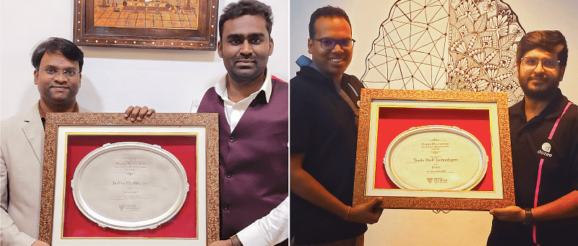Dozee and Savemom win Anjani Mashelkar Inclusive Innovation Awards 2020

The Anjani Mashelkar Foundation has been pioneering an Inclusive Innovation movement in India for 10 years. Instituted in 2011 with the aim of recognising innovators who develop solutions for excluded members of society, the Anjani Mashelkar Inclusive Innovation Award (AMIIA) is focussed on making high technology work for the poor. Over the last decade, it has awarded innovations with potential for ground-breaking impact. This included 3Nethra -an intelligent, portable, non-invasive, low cost device that helps in pre-screening of five major eye diseases; an affordable ‘Dengue Day 1 test’ that can detect dengue fever within minutes; and Bandicoot -a robot that cleans manholes remotely using robotic arms and computer vision. And, in doing so, the award has consistently put the focus on the need and opportunity to fuel innovation for the most disadvantaged sections of society in order to ‘include’ them into the mainstream.
In its 10th year, the 2020Anjani Mashelkar Inclusive Innovation Award was presented to innovations in two categories. The first was innovations addressing the Covid-19 pandemic which includes diagnosis, testing, treatment, vaccination, monitoring, ease of life, awareness, etc. The second, was for innovations in areas such as energy, education, agriculture, finance, healthcare (not Covid-19 related), water & sanitation.
Dozee (by Turtle Shell Technologies) and Savemom (by JioVio Healthcare) were selected as the winners for the two respective categories by a high-profile independent jury.
Anjani Mashelkar Inclusive Innovation Award 2020 winners: Dozee and Savemom
Amid the pandemic, the availability of ICU beds has been a challenge globally. Just last week, as India’s COVID-19 caseload went past 93 lakh, the Supreme Court declined the Delhi government’s appeal to lift a High Court stay of its directive to private hospitals to reserve 80 percent of their Intensive Care Unit (ICU) beds for COVID-19 patients. The lack of ICU beds was a major concern even before the pandemic – experts believe that India requires almost three times the current number to avoid preventable deaths. Founded by Mudit Dandwate and Gaurav Parchani, Dozee has the potential to partly address this bleak situation, believes the Anjani Mashelkar Foundation.
Dozee (by Turtle Shell Technologies) is a continuous, contact-free vitals monitor with remote monitoring capabilities and alert systems that converts any bed into a step down ICU in less than two minutes. Kept under the mattress, Dozee monitors patients’ heart rate, respiration rate, heart rate variability, oxygen saturation levels, blood pressure and activity levels through technology based on Ballistocardiography (BCG). The device has medical-grade accuracy of 98.4 percent but costs 1/10th of conventional alternatives. In these difficult times, Dozee can help reduce the workload of healthcare staff by almost 50 percent .Dozee has already enabled 3,000 beds with monitoring, helping 5000+ patients in seven states.
The second Anjani Mashelkar Inclusive Innovation Award was also awarded to a HealthTech startup – Savemom, an IoT-based maternal healthcare solution that monitors a mother’s health using smart wearables. Although maternal deaths have declined in recent years, the World Health Organisation reports that India still accounts for about one-fifth of global maternal deaths annually. It is here that innovations like Savemom can play a critical role.
Savemom (by JioVio Healthcare) collects physiological signals – blood pressure, heart rate, ECG etc. – continuously from the mother and processes them with advanced techniques to monitor her health. The vitals are uploaded in the cloud for doctors to view remotely. Caregivers and doctors are alerted if any mother’s risk assessment is negative, so that preventive measures may be taken at the right time. By collaborating with local government agencies and NGOs, Savemom provides 1,000 days care to mother and child for Rs. 1,000, covering antenatal check-ups of the mother and postnatal care of the baby. Savemom has been deployed in over 100 Indian villages, benefiting thousands of rural mothers who otherwise have limited or no access to healthcare.
A call to support inclusive innovations
Announcing the winners, eminent scientist Dr. Raghunath Anant Mashelkar, who instituted the award in honour of his mother, shared, “ This year is the 10th year of the award. But it is even more special, because this year, 2020, has shown us the importance of the very subject of the award – inclusive innovation.” He noted that the Coronavirus pandemic has caused an unprecedented devastation in terms of loss of lives and livelihoods and increased the inequalities exponentially. “And, the only way to recover is by accelerated inclusive growth.”
Dr Mashelkar shared that while the winners of the previous editions have gone on to win more awards, what makes their contribution so special is the difference they have been able to make in the lives of thousands of people. He noted that some of the innovations are not just creating significant impact in India but also beyond. “Axiostat, an advanced wound dressing that stops traumatic external bleeding, developed by Leo Maveley has a presence in 40 countries. Shyam Vasudev’s 3Nethra has reached 25 countries.”
Congratulating the 2020 AMIIA winners, he said, “Their innovations are not limited to technology alone. But also in designing, co-creating, producing and distributing at prices that can be afforded by the masses. These innovations will not only support the dream of emerging digital India but also its ‘digital health’ agenda.”
Dr Mashelkar shared that the foundation encourages the innovators with support that goes beyond just cash awards. “We open opportunities for the awardees to seek funding, mentorships and partnerships.” He also called on the government and the ecosystem to support inclusive innovators. “We all have to support inclusive innovators – not just with venture funds but also with adventure funds, with soft funds. And it is not just the private sector that has a role to play here – in fact, the government can become the largest customer for inclusive innovations via progressive and promotional public procurement policies, the 5Ps, which will ultimately result in the welfare of the masses.”
